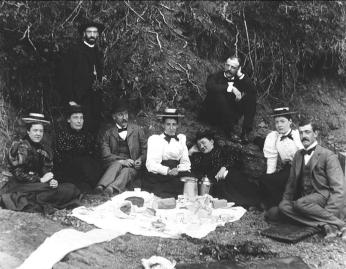Cool name.
Here he is after the war.

Posted on 10/18/2024 9:43:38 AM PDT by SeekAndFind
The Battle of Bull Run was the first major land battle of the Civil War, and it drew a group of spectators to watch the action on July 21, 1861, near Manassas, Virginia.
Onlookers gathered with something of a sporting atmosphere, as many Northerners expected the war to end in a swift Union victory. Describing the scene for The Times of London, Irish war reporter William Howard Russell wrote, “A lady with opera glasses shouted loudly at each discharge of cannon: ‘That is splendid. Oh my! Is not that first rate?’”
Union Captain John Tidball later wrote that people came “in carts loaded with pies and other edibles.” In fact, so many people brought food and drink to the hill overlooking Bull Run Creek that the conflict became known as “the picnic battle.” The crowd even included some prominent politicians: Senators Benjamin Wade from Ohio, Zachariah Chandler from Michigan, James Grimes from Iowa, and future Vice President Henry Wilson of Massachusetts, who brought and distributed sandwiches. The battle ended with what was a surprising outcome for the spectators, as the Confederate forces managed to drive the Union Army back, sending soldiers retreating through the crowd.
Senators Chandler and Wade attempted to stop the retreat — Chandler by blocking the road, and Wade by picking up a rifle and threatening deserters — but they were ultimately unsuccessful.
Many Union soldiers had only signed up for a 90-day war (as that was all the President could mandate by law), and the Confederate victory at Bull Run was a chilling sign that the fight was likely to stretch on longer than anyone had anticipated.
When the dissolute Roman legions encountered the robust Gothic armies, they found that they were accompanied by their families, who stood on the sidelines screaming and shouting, to exhort their fathers to feats of valor and fearlessness.
This became the basis for what was to become, in the “dark ages”, the feudal culture of honor and bravery.
A man in Charleston SC before the war said if war does come he could wipe up any blood that was shed with his handkerchief. People had no idea what had been unleashed.
Artists too. Imagine if one side had M-1 Garands at a safe distance.
> People had no idea what had been unleashed. <
Yep. And we saw the same thing in 1914 as WW1 began. British soldiers heading to the front said, “We’ll give the Kaiser a bloody nose, and be home by Christmas.”
And so a whole generation of British men was damn near wiped out.
“We’ll give the Kaiser a bloody nose, and be home by Christmas.”
Well they were right. They were home by Christmas......of 1918.
In 1961 my Dad took me to the reenactment.
ZERO idea what as unleashed. Sadly, it seems we have to relearn that idea time after time.
Also during that time it was considered ‘bad form’ to attack civilians. So families and squawkers could come out to watch the fighting. Sherman’s March through the South ended that sanity forever.
Public square, public hangings. Now doneness prevents it.
“wokeness”. Sheesh!
“Union Captain John Tidball”
Cool name.
And so a whole generation of British men was damn near wiped out.
My grandfather immigrated to Canada from England a few years prior to WWI. Remember him talking about WWI and the fact that a whole generation of young men born in the late 1800's were decimated by WWI. England was bled white was his term to describe the losses.
Cool name.
Here he is after the war.

One side wanted to invade and subjugate the other, and of course people fought back against the invaders.
People will fight hard to defend their homeland.
Biden walks like Mr. Tudball


LOL... IKR???
Disclaimer: Opinions posted on Free Republic are those of the individual posters and do not necessarily represent the opinion of Free Republic or its management. All materials posted herein are protected by copyright law and the exemption for fair use of copyrighted works.